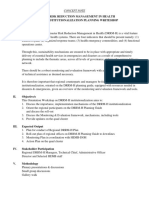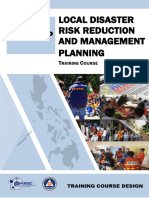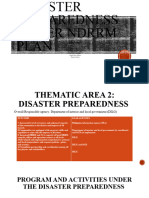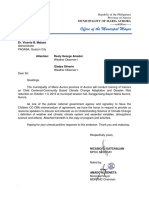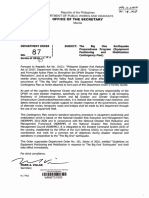5 Day NDRP Enhancement Concept Note 090516
5 Day NDRP Enhancement Concept Note 090516
Uploaded by
Dax Kin Dy VintolaCopyright:
Available Formats
5 Day NDRP Enhancement Concept Note 090516
5 Day NDRP Enhancement Concept Note 090516
Uploaded by
Dax Kin Dy VintolaOriginal Description:
Copyright
Available Formats
Share this document
Did you find this document useful?
Is this content inappropriate?
Copyright:
Available Formats
5 Day NDRP Enhancement Concept Note 090516
5 Day NDRP Enhancement Concept Note 090516
Uploaded by
Dax Kin Dy VintolaCopyright:
Available Formats
1
CONCEPT NOTE
NATIONAL DISASTER RESPONSE PLAN (NDRP)
ENHANCEMENT FOR HYDROMET AND FINALIZATION OF EARTHQUAKE AND
TSUNAMI WORKSHOP AND WRITESHOP
Background:
The National Disaster Response Plan (NDRP) is the Government of the Philippines’
“multi-hazard” response plan. Emergency management as defined in the NDRRM Act of 2010
(RA10121), is the organization and management of resources to address all aspects or
phases of the emergency, mitigation of, preparedness for, response to and recovery from a
disaster or emergency. The Office of Civil Defense (OCD), in consultation with NDRRMC
member agencies developed the NDRP. It outlines the processes and mechanisms to
facilitate a coordinated response by the national and/or at the local level
departments/agencies. Local government institutions are responsible for the development and
improvement of local response plans relative to their areas of responsibility and underlying
risks.
The NDRP acknowledges the existence of two levels of operation: one is at the
national level and the second is at the LGU level. The national level involves the National
Disaster Risk Reduction and Management Council (NDRRMC) and the Regional Disaster Risk
Reduction and Management Councils (RDRRMCs). The LGU level involves the
Provincial/City/Municipal Disaster Risk Reduction and Management Councils
(P/C/MDRRMCs). The content of the NDRP involves the operation at the national level only
but shows the integration of the national response to the LGU level of operation.
Memorandum Order No. 23, s.2014 dated 20 Oct 2014, NDRP for HydroMet officially
sealed the utilization of the new Philippine Cluster Approach System and its operational
workflow. Also, the NDRP for Earthquakes and Tsunamis was drafted and has been subjected
to series of simulation exercises/drills by the NDRRMC - Response Cluster to test its
applicability and effectiveness.
Now, at the national level, the response mechanisms has proven its effectiveness from
the past disasters specially for natural disasters like TY RUBY, GLENDA, LANDO, and even
during plan activities such as APEC 2015, Papal Visit, and Black Nazarene Traslacion. Thus,
an implementing group through the Vice-Chairperson for Response under the leadership of
the Department of Social Welfare and Development (DSWD) is recommended to re-focus for
the enhancement of the NDRP for HydroMet and finalization of the NDRP for Earthquake and
Tsunami. The plan is to organize a workshop composed of disaster response technical people
including partner civilian counterparts to address the important thematic areas of DRRM;
Response.
Objectives:
1. To enhance the cluster objectives, memberships and specific roles and
responsibilities of lead and supporting agencies/offices;
Concept Note for the NDRP Review and Evaluation Summit
2
2. To formally identify the distinct inclusions of the different alert levels, levels of action
and the clear procedures of the Response Cluster workflow; and
3. To address the needs to align and identify Cluster leaderships and memberships for
better command and control mechanism in relation with the Incident Management Teams
(IMT).
Expected Outcomes:
1. An immediate local operable and interoperable Response Clusters and IMT
mechanisms related to the updated NDRP for Hydro-Met and completed NDRP for
Earthquakes and Tsunamis Manual;
2. Well established and better functional, usable, useful, and used command and
control frameworks for the Emergency Operations Center (EOC) in disaster areas;
3. Identified standard alert levels, levels of action, and response operations workflow
for use at all levels; and
4. Clear mandated actions and resources of all Cluster leads and members including
IMTs during disaster response operations.
Concept of the Workshop:
With the approval of the National Disaster Response Plan for Hydro-Met, and the
final drafting of the NDRP for Earthquakes and Tsunamis, there is a need to revisit its
implementation to fortify its foundation through a series of workshops for the enhancement of
NDRP for Disaster Response Management Operations.While there are ongoing series of
events to highlight these undertakings from national down to local level, it is imperative that
parallel actions be undertaken to update and finalized such documents as mandated by the
new leadership of the NDRRMC.
The proposed workshop is a five (5)-day activity that will be participated by national
key players of the Response Cluster, IMTs and its partners from the private sectors and
volunteer groups from 30 August to 03 September 2016.
Invited participants are those with experiences in disaster response operations of the
National Response Cluster and National IMTs at the strategic level with delegated decision-
making authority or recommendatory functions.
The attendees shall be tasked to organize and group according to their respective
mandate, expertise and capabilities following the NDRP’s Cluster Approach System and
Incident Command Systems’ organization:
Food and Non-Food Item (FNI)
Camp Coordination and Camp Management (CCCM)
IDP Protection
International Humanitarian Assistance (IHA)
Law and Order (LAO)
Health
Logistics
Emergency Telecommunications (ETC)
Education
Concept Note for NDRP Enhancement and Finalization Workshop
3
Search, Rescue and Retrieval (SRR)
Management of the Dead and the Missing (MDM)
National Incident Management Teams (NIMT)
Each Cluster and the IMT shall be facilitated by its lead agency and other disaster
response officer with vast experiences in response operations. There will be templates to be
used, checklists to be made and other tools that will be utilized as materials for the activity.
Preparatory Activities:
1. Convening of Response Clusterand IMT meetings;
2. Orientation of its members,documentorsand facilitators; and
3. Facilitators and documentors will prepare their respective checklists and other tools.
Program and Agenda:
DAY (1) ONE
TIME PARTICULARS METHODOLOGY OPR
0800H – 0830H Arrival and Registration Secretariat and
Operations Division
0830H – 0840H Invocation and National Anthem Plenary Session Secretariat and
(Audio Visual Presentation) Operations Division
0840H – 0850H Introduction of Participants Plenary Session Dir. Felino Castro,
DreamB, DSWD
0850H – 0900H Welcome Remarks Plenary Session Usec. Vilma B.
Cabrera
DSWD
0900H – 0910H Keynote Speech Plenary Session Usec. Ricardo B. Jalad
Executive Director,
NDRRMC and
Administrator, OCD
0910H – 0920H Photo Opportunity VIPs with all
Participants
0920H – 0930H Workshop Overview Plenary Session Ms. Susana E.
Quiambao, OIC,
Operations Division
0930H – 1030H Orientation on the National Lecture/Discussion LTC EDWIN C
Disaster Response Plan (NDRP) SADANG GSC (SC) PA,
for Hydro-Met, Earthquakes, SMA to CDA
and Tsunamis
1030H – 1200H Disaster Response Management Lecture/Discussion LTC EDWIN C
Operational Spectrum SADANG GSC (SC) PA,
SMA to CDA
Concept Note for the NDRP Review and Evaluation Workshop
4
1200H – 1300H Lunch Break
1300H – 1330H Fundamentals of PDRA-APP Lecture/Discussion MS. LENIE ALEGRE
OIC, Operations
Service
1330H – 1400H Discussion on Cluster Approach Lecture/Discussion MR. SONNY PATRON,
System CDO II, OD
1400H – 1430H Basics of Incident Command Lecture/Discussion MR. JOEMAR PEREZ,
System TS II, ETD
1430H – 1500H Interoperability of Response Lecture/Discussion LTC EDWIN C
Cluster and IMT SADANG GSC (SC) PA,
SMA to CDA
&
MR. JOEMAR PEREZ,
TS II, ETD
1500H – 1600H Workshop 1: Formulation of Breakout Sessions / Facilitators, Cluster
the General and Specific Workshop Leads and Members
Objectives of the Clusters
1600H – 1700H Workshop 2: Identification of Breakout Session / Facilitators, Cluster
Cluster Members and Specific Workshop Leads and Members
Roles and Responsibilities of
Agencies
1700H – 1730H Administrative Announcement Plenary Session Secretariat
DAY (2) TWO
TIME PARTICULARS METHODOLOGY OPR
0800H – 0830H Registration and Recap Plenary Session Secretariat and
Operations Division
0830H – 1030H Presentation of Workshop 1 and Plenary Session Facilitators,Cluster
2 Outputs and Discussion on Key Leads and Members
Points
(Working Morning Break)
1030H – 1200H National Response Cluster Lecture/Discussion MR. CHRISTOPHER
Incident Management System GRAJO, ERIC
(IMS)
1200H – 1300H Lunch Break
1300H – 1500H Workshop 3: Formulation of Breakout Session / Facilitators,Cluster
Concept of Operations, Levels of Workshop Leads and Members
Response Action, Alert Levels,
Concept Note for NDRP Enhancement and Finalization Workshop
5
Triggers for Actions-Localand
International Key Responders
(Working Afternoon Break)
1500H – 1700H Presentation of Workshop 3 Plenary Session Facilitators,Cluster
Outputs and Discussion on Key Leads and Members
Points
1700H – Administrative Announcement Plenary Session Secretariat
1730H
DAY (3) THREE
TIME PARTICULARS METHODOLOGY OPR
0800H – 0830H Registration and Recap Plenary Session Secretariat and
Operations Division
0830H – 1200H NDRP HydroMet and Earthquake Plenary Workshop Facilitators, Cluster
& TsunamiInitial Writeshop Leads and Members
(Working Morning Break)
1200H – 1300H Lunch Break
1300H – 1700H Presentation and Discussion on Plenary Workshop Facilitators, Cluster
the Cluster Operational Leads and Members
Guidelines
(Working Afternoon Break)
1700H – Administrative Announcement Plenary Session Secretariat
1730H
DAY (4) FOUR
TIME PARTICULARS METHODOLOGY OPR
0800H – 0830H Registration and Recap Plenary Session Secretariat and
Operations Division
0830H – 0930H Briefing of the Simulation Plenary Session LTC EDWIN C
Exercise (SIMEX) Mechanics SADANG GSC (SC) PA,
SMA to CDA
0930H – 1600H Start of SIMEX Plenary Workshop LTC EDWIN C
(Working Morning Break) SADANG GSC (SC) PA,
(Working Lunch) SMA to
(Working Afternoon Break) CDAFacilitators,
Cluster Leads and
Members
Concept Note for the NDRP Review and Evaluation Workshop
6
1600H – 1700H Hotwash, Lessons Learned, Best Plenary Workshop LTC EDWIN C
Practices, and Evaluation SADANG GSC (SC) PA,
SMA to CDA
Facilitators, Cluster
Leads and Members
1700H – Administrative Announcement Plenary Session Secretariat
1730H
DAY (5) FIVE
TIME PARTICULARS METHODOLOGY OPR
0800H – 0830H Registration and Recap Plenary Session Secretariat and
Operations Division
0830H – 0930H Briefing of the Final Writeshop Plenary Session Dir. Felino Castro,
Mechanics DreamB, DSWD
0930H – 1130H Workshop 4: Formulation and Plenary Workshop LTC EDWIN C
Submission of Cluster’s Directory SADANG GSC (SC) PA,
and List of Inventory of SMA to CDA
Resources at the National Level Facilitators, Cluster
Leads and Members
1130H – 1200H Presentation of Workshop 4
Outputs
0930H – 1500H Start of Final Writeshop Plenary Workshop LTC EDWIN C
(Working Morning Break) SADANG GSC (SC) PA,
(Working Lunch) SMA to CDA
(Working Afternoon Break) Facilitators, Cluster
Leads and Members
1500H – 1600H Ways Forward and Next Steps Plenary Workshop Dir. Felino Castro,
DreamB, DSWD
1600H – 1700H Closing Ceremony Plenary Session Workshop
- Handover of Deliverables Secretariat
of the Most Senior
Participants to Sec. Judy
Taguiwalo, DSWD
- Signing of the Declaration
of Commitment
- Closing Message of Sec.
Taguiwalo
Participants / Facilitators / Support Staff
Concept Note for NDRP Enhancement and Finalization Workshop
7
The following shall act as resource persons and facilitators for the different Response
Cluster during the summit:
Resource Persons and Facilitators
1. Director Felino Castro
2. LTC EDWIN C SADANG GSC (SC) PA
3. Mr. Christopher Grajo
Facilitators
4. Ms. Susan Quiambao
5. Mr. Sonny Patron
6. Ms. Sarah Ulat
Secretariat & Documenter
7. 3 Staff from ERIC
8. Ms. Jacqueline Manara
The following participants or their authorized representatives with delegated decision-
making authority or recommendatory functions that is part of the decision making
process.
DSWD: USec Vilma Cabrera plus 3 staff
DOH: Director Gloria Balboa
PHIVOLCS: Dir. Renato U. Solidum Jr.
PAGASA: Mr. Vicente Malano
DFA: Director Edward Yulo
DPWH: Engr. Visna Manio
NEDA: Dir. Cynthia Villena
DepED: Dir. Ronilda Co
DOE: ASec. Matanog Mapandi
AFP: One (1) each HADR Officer of the following offices;
- J3, AFP
- J7,AFP
- J6, AFP
- J4, AFP
- J5, AFP
- Health Service, AFP
DILG: Dir. Allan Tabell
PNP: PSSUPT ROMEO SJ STA ANA JR
PSUPT JOHNNY CAPALOS
BFP: FSUPT JOSELITO A CORTEZ
PCG: CAPT JUANCHO MARAÑO
DOTC: Mr. Emil M. Ocfemia
PRC: Mr. Leonard Ebajo
MGB: Usec. Mario Luis Jacinto
NOAH: Dr. Mahar Lagmay
MMDA: Dir. Ramon Santiago
NWRB: Dr. Sevillo David Jr.
OCD: Mr. Kelvin Ofrecio, CEIS Division
Ms. Almarose Tabliago, Installation and Logistics Division
Concept Note for the NDRP Review and Evaluation Workshop
8
Ms. Lenie Alegre, Operations Service
Ms. Shelby Ruiz, Operations Service
Mr. Relan Jay Assuncion
Dir. Mechito Castro, OCDRO I
Dir. Norma Talosig, OCDRO II
Dir. Alex Uy, OCDRO CAR
Dir. Josefina Timoteo, OCDRO III
Dir. Vicente Tomazar, OCDRO IV-A
Dir. Bernardo Rafaelito Alejandro IV, OCDRO V
Dir. Rosario Cabrera, OCDRO VI
Dir. Olivia Luces, OCDRO VII
Dir. Ana Cañeda, OCDRO X
Dir. Liza Mazo, OCDRO XI
Dir. Susana Cruz, OCDRO NCR
Administrative Arrangements & Responsibilities:
1. Department of Social Welfare and Development (DSWD) as the Vice
Chairperson for Response, will be the lead agency on the significant actions that
needs to be accomplished in relation with the NDRP Enhancement Workshop and
Writeshop in coordination with OCD.
2. Office of Civil Defense as the Coordinator will be responsible for the coordination
process of the workshop and other pertinent activities prior to its implementation. Also,
will take on the responsibility of organizing the participants through inter-agency
meetings prior to the D-Day.
3. Member Agencies of Each Response Cluster will provide their respective
representatives who will act as the lead and members of the cluster, together with the
initial list of optimal resources, systems and equipment to commit during actual
disaster operations.During the duration of the exercise, they will act as the focal
persons of their respective departments and agencies.
Dates and Location of the Workshop:
Dates: 12 September – 16 September 2016
Venue: To be determined (TBD)
Uniform
Day 1: Respective agency’s Uniform of the Day (UOD)
Day 2 – 4: Smart Casual
Day 5: Respective agency’s Uniform of the Day (UOD)
Funding:
Funding will be co-shared by OCD and DSWD. OCD will shoulder the cost for
accommodation, supplies and materials, communications expenses and other incidental
expenses amounting to Php 461,150.00 chargeable against the APB CY 2016 Operations
Division.
Concept Note for NDRP Enhancement and Finalization Workshop
9
Travel Expenses
The travel expenses of regional participants during the training proper are chargeable
to the respective APB 2016 of their regional offices.
Coordinating Guidelines
1. Recommended attendees/participants must be in the level of decision makers;
2. Names of participants must be provided to the Secretariat three (3) days prior the
activity. Participants may contact the Secretariat at (02) 376-4240 or at
ocd_opnsdiv@yahoo.com.
3. Participants are required to bring their respective laptop;
4. Participants are instructed to have their respective agency’s contact person and details
including their list of resources for response operations at the national level;
5. All participants are directed to register online, submit all requirements and monitor
other announcements at responseops.ph;
6. All participants are required to inform the Secretariat of their check-in dates for
coordination with the designated hotel; and
7. The Secretariat shall manage the time strictly. All participants are encourage to
cooperate.
Concept Note for the NDRP Review and Evaluation Workshop
You might also like
- Position Desrcription Form Clerk of Court VDocument2 pagesPosition Desrcription Form Clerk of Court Vattyjoan81% (16)
- NYC Meeting 2007 (Final Draft)Document16 pagesNYC Meeting 2007 (Final Draft)Peter Hasson50% (2)
- Rapid Disaster Assessment and Needs AnalysisDocument47 pagesRapid Disaster Assessment and Needs AnalysisMark Jerbert Gelacio33% (3)
- Introduction To Amended PDRA GuidelinesDocument31 pagesIntroduction To Amended PDRA GuidelinesCar Dilgopcen100% (2)
- CBDRRM Training Course DesignDocument12 pagesCBDRRM Training Course DesignMichelle Marco Yungco100% (2)
- 1.8 OpCen ManualDocument36 pages1.8 OpCen Manualmdrrmo sinait100% (4)
- Templates For Local Disaster Risk Reduction and Management PlanningDocument10 pagesTemplates For Local Disaster Risk Reduction and Management Planningjofel delicanaNo ratings yet
- DRRM H Concept NoteDocument3 pagesDRRM H Concept Noteralph falculan100% (1)
- Ldrrmfip 2019Document10 pagesLdrrmfip 2019Zeno Silva100% (1)
- Ontingency Lanning: Raining OurseDocument10 pagesOntingency Lanning: Raining OursevintolaNo ratings yet
- CP Guidebook As of January 2020Document66 pagesCP Guidebook As of January 2020Creativ Worx100% (11)
- Response Clusters: Camp Coordination and Camp ManagementDocument9 pagesResponse Clusters: Camp Coordination and Camp ManagementDax Kin Dy VintolaNo ratings yet
- Copyright Law LLM PaperDocument22 pagesCopyright Law LLM PaperramiolwanNo ratings yet
- LDRRMP Training Course Design - 2021-03-06-12-31-55-pmDocument10 pagesLDRRMP Training Course Design - 2021-03-06-12-31-55-pmvintolaNo ratings yet
- 3-Day Pdna Training Course Concept NoteDocument7 pages3-Day Pdna Training Course Concept NoteEnp Titus Velez100% (1)
- DRRM Private SectorDocument7 pagesDRRM Private Sectorrayban ariñoNo ratings yet
- Rev4 - Concept Note Re - Virtual Orientation ACT Local Programme Training Writeshop 2024 - 08october2024Document6 pagesRev4 - Concept Note Re - Virtual Orientation ACT Local Programme Training Writeshop 2024 - 08october2024MDRRMO ANTIPASNo ratings yet
- To PiñanDocument5 pagesTo PiñanIkigai Sa LaLiNo ratings yet
- NDRP Hydro Meteorological Hazards As of 2014Document159 pagesNDRP Hydro Meteorological Hazards As of 2014Rex RevelarNo ratings yet
- Susan Quiambao - CNDR Summit PPT Edited As of 14 JulyDocument28 pagesSusan Quiambao - CNDR Summit PPT Edited As of 14 JulyRemer JalbunaNo ratings yet
- Citizens Charter MDRRMODocument11 pagesCitizens Charter MDRRMORodgelyn Francisco100% (1)
- Group1 - B.A.GDocument29 pagesGroup1 - B.A.GGerlynjane BalbadaNo ratings yet
- 10 Attendance To Activity Report - FDocument4 pages10 Attendance To Activity Report - FCamille AquinoNo ratings yet
- The Philippine Disaster Risk Reduction and Management Act of 2010Document26 pagesThe Philippine Disaster Risk Reduction and Management Act of 2010Tah IehNo ratings yet
- PDRRM Coordination and Communication Protocol: All Types of HazardsDocument14 pagesPDRRM Coordination and Communication Protocol: All Types of HazardsZeno SilvaNo ratings yet
- DRRM Concepts Principles and Trends RA 10121Document26 pagesDRRM Concepts Principles and Trends RA 10121Jum Storage100% (1)
- Guidelines Housing PDFDocument51 pagesGuidelines Housing PDFakhilkuwarNo ratings yet
- Operation Listo Disaster Preparedness Manual Presentation Final - Zamboanga - RegionalDocument89 pagesOperation Listo Disaster Preparedness Manual Presentation Final - Zamboanga - RegionalYoling Bovida100% (1)
- Office of The Municipal Mayor: Dr. Vicente B. MalanoDocument7 pagesOffice of The Municipal Mayor: Dr. Vicente B. MalanoAnj MatiasNo ratings yet
- SOP of NDMADocument32 pagesSOP of NDMAjast5No ratings yet
- Guidelines Land Use PDFDocument63 pagesGuidelines Land Use PDFakhilkuwarNo ratings yet
- Alpha, Bravo, Charlie (Pages 12 17)Document64 pagesAlpha, Bravo, Charlie (Pages 12 17)ninjayoyogNo ratings yet
- Office of The SecretaryDocument17 pagesOffice of The SecretaryAbubacar SamsodenNo ratings yet
- Operation L!STODocument26 pagesOperation L!STOflorianjuniorNo ratings yet
- NDRMMCDocument27 pagesNDRMMCDaniel BalubalNo ratings yet
- Rehabilitation and Recovery Committee: Iloilo City Disaster Risk Reduction and Management Council 18 July 2017Document19 pagesRehabilitation and Recovery Committee: Iloilo City Disaster Risk Reduction and Management Council 18 July 2017fenan sollanoNo ratings yet
- DepED CO Contingency Planning For The Big One - PPT Presentation For The RPsDocument99 pagesDepED CO Contingency Planning For The Big One - PPT Presentation For The RPsariel.mendezNo ratings yet
- NDRRMC Philippine DRRM SystemDocument43 pagesNDRRMC Philippine DRRM SystemErnan Baldomero100% (2)
- Training Course Design - RDANA - 2021-06-15-01-51-52-pmDocument9 pagesTraining Course Design - RDANA - 2021-06-15-01-51-52-pmimboy amol100% (1)
- DRRM Training SyllabusDocument3 pagesDRRM Training SyllabusL'Michelli Kilayko HorladorNo ratings yet
- Mosar-Wisar (Scribd)Document10 pagesMosar-Wisar (Scribd)baroukNo ratings yet
- Development and Enhancement of Contingency Plans Amidst COVID-19 For RegionsDocument34 pagesDevelopment and Enhancement of Contingency Plans Amidst COVID-19 For RegionsMichael LaguraNo ratings yet
- MAY20t6: Office of The SecretaryDocument45 pagesMAY20t6: Office of The SecretaryGie Wan-aNo ratings yet
- ACTIVITY DESIGN BPATS Per BarangayDocument4 pagesACTIVITY DESIGN BPATS Per BarangayJeffrey AmboyNo ratings yet
- Central Aar-NsedDocument10 pagesCentral Aar-Nsedgabitanalex9No ratings yet
- Programme - NAP Expo - ENGDocument1 pageProgramme - NAP Expo - ENGrespaldo celNo ratings yet
- MDRRMC 3rd Quarter Meeting 2023Document54 pagesMDRRMC 3rd Quarter Meeting 2023MDRRMO TUBONo ratings yet
- Local Government Unit Disaster Preparedness ManualDocument32 pagesLocal Government Unit Disaster Preparedness ManualErnan BaldomeroNo ratings yet
- Federal Register-02-28462Document1 pageFederal Register-02-28462POTUSNo ratings yet
- Federal Register / Vol. 67, No. 217 / Friday, November 8, 2002 / NoticesDocument4 pagesFederal Register / Vol. 67, No. 217 / Friday, November 8, 2002 / NoticesPOTUSNo ratings yet
- Signed PDNA Training Course Design - 2022-04-21-01-05-12-pmDocument10 pagesSigned PDNA Training Course Design - 2022-04-21-01-05-12-pmbogartjose_rayNo ratings yet
- Disaster Risk Reduction and Management Experience in The Philippines (DRRM)Document25 pagesDisaster Risk Reduction and Management Experience in The Philippines (DRRM)Froilan CelestialNo ratings yet
- BP-HZN - BLYOO349O94: Exhibit No. - Worldwide Court IncDocument5 pagesBP-HZN - BLYOO349O94: Exhibit No. - Worldwide Court IncOSDocs2012No ratings yet
- NDRF Training Schedule-Nov 2024-DMIDocument6 pagesNDRF Training Schedule-Nov 2024-DMIdy452430No ratings yet
- Assignment 3 DRRM Planning - 2021-03-06-11-41-22-AmDocument7 pagesAssignment 3 DRRM Planning - 2021-03-06-11-41-22-AmCdrrmc DigosNo ratings yet
- Barangay Disaster PreparednessDocument40 pagesBarangay Disaster PreparednessPrince OboNo ratings yet
- NDRRMC Memorandum No 137 S 2022Document10 pagesNDRRMC Memorandum No 137 S 2022Janey CNo ratings yet
- 2.listo PresentationDocument36 pages2.listo PresentationKrystal Mae Quibol-PaciosNo ratings yet
- UK-Japan HADR Sem-21Jan2016Document25 pagesUK-Japan HADR Sem-21Jan2016boge_okNo ratings yet
- Faqs On KC NCDDP Npmo Disaster Response ProtocolsDocument45 pagesFaqs On KC NCDDP Npmo Disaster Response ProtocolsShielany AbadNo ratings yet
- Chapter 3 A.3. Coordination Protection ClusterDocument5 pagesChapter 3 A.3. Coordination Protection ClusterMaria Rose AquinoNo ratings yet
- Earthquake and Tsunami Version 2: Matt WilliamsDocument107 pagesEarthquake and Tsunami Version 2: Matt WilliamsDarlene GanubNo ratings yet
- IFRC Emergency Response Framework - 2017Document18 pagesIFRC Emergency Response Framework - 2017phyo_thar_1No ratings yet
- Res.A.814 (19) Guidelines For The Avoidance of False Distress Alerts - Netherlands Regulatory Framework (NeRF) - MaritimeDocument11 pagesRes.A.814 (19) Guidelines For The Avoidance of False Distress Alerts - Netherlands Regulatory Framework (NeRF) - MaritimeRohit RajNo ratings yet
- Experience in the Management of Radioactive Waste After Nuclear Accidents: A Basis for PreplanningFrom EverandExperience in the Management of Radioactive Waste After Nuclear Accidents: A Basis for PreplanningNo ratings yet
- A Listening Self-Inventory: Instructions: Go Through The Following Questions, Checking Yes or No Next To Each QuestionDocument2 pagesA Listening Self-Inventory: Instructions: Go Through The Following Questions, Checking Yes or No Next To Each QuestionDax Kin Dy Vintola100% (1)
- A Listening Self-Inventory: Instructions: Go Through The Following Questions, Checking Yes or No Next To Each QuestionDocument2 pagesA Listening Self-Inventory: Instructions: Go Through The Following Questions, Checking Yes or No Next To Each QuestionDax Kin Dy Vintola100% (1)
- Script For Case Interview PDFDocument6 pagesScript For Case Interview PDFDax Kin Dy VintolaNo ratings yet
- M1.1. Korea Experience - Flattening The Curve On COVID-19 PDFDocument90 pagesM1.1. Korea Experience - Flattening The Curve On COVID-19 PDFDax Kin Dy VintolaNo ratings yet
- Script For Contact InterviewDocument8 pagesScript For Contact InterviewDax Kin Dy VintolaNo ratings yet
- Guide To Users of The Index of Index Occupational ServicesDocument4 pagesGuide To Users of The Index of Index Occupational ServicesDax Kin Dy Vintola100% (1)
- List of Barangays by Municipality Province of Agusan Del SurDocument7 pagesList of Barangays by Municipality Province of Agusan Del SurDax Kin Dy VintolaNo ratings yet
- Leadership Competency Development Guide ThoroughnessDocument23 pagesLeadership Competency Development Guide ThoroughnessDax Kin Dy VintolaNo ratings yet
- 7 PDRRMP 2017-2022 - Contents (Final) Edited by Dax VintolaDocument179 pages7 PDRRMP 2017-2022 - Contents (Final) Edited by Dax VintolaDax Kin Dy VintolaNo ratings yet
- DBM CCC Dilg JMC 2015-01 Lccet W AnnexesDocument29 pagesDBM CCC Dilg JMC 2015-01 Lccet W AnnexesDax Kin Dy VintolaNo ratings yet
- Climate Change Primer Final PDFDocument21 pagesClimate Change Primer Final PDFDax Kin Dy VintolaNo ratings yet
- Pdrrmo Division Functions and ResponsibilitiesDocument4 pagesPdrrmo Division Functions and ResponsibilitiesDax Kin Dy Vintola50% (2)
- A Trainer's Handbook-Climate Change Adaptation and Disaster Risk Reduction Management in Tourism Circuit PlanningDocument88 pagesA Trainer's Handbook-Climate Change Adaptation and Disaster Risk Reduction Management in Tourism Circuit PlanningDax Kin Dy VintolaNo ratings yet
- Mike HestrinDocument4 pagesMike HestrinMike Hestrin Files100% (2)
- Digital Marketing PlanDocument62 pagesDigital Marketing PlanJAJNo ratings yet
- Advertising Standards Council of IndiaDocument3 pagesAdvertising Standards Council of IndiaDeep JoshiNo ratings yet
- PDRF PR - PDRF Boosts QC Barangays' Disaster PreparednessDocument2 pagesPDRF PR - PDRF Boosts QC Barangays' Disaster PreparednessJulia Isabel M. AndresNo ratings yet
- Daryl Shane Pate Bond ReductionDocument2 pagesDaryl Shane Pate Bond Reductionjafranklin-1No ratings yet
- ''Global South Vs Third World"Document18 pages''Global South Vs Third World"Allen Torio100% (1)
- Case Report Grant Funding ApplicationDocument2 pagesCase Report Grant Funding ApplicationGlobal Advances in Health and MedicineNo ratings yet
- Pol Sci TanviDocument18 pagesPol Sci TanviShubhankar ThakurNo ratings yet
- San Miguel Corporation v. Secretary of LaborDocument2 pagesSan Miguel Corporation v. Secretary of LaborIldefonso Hernaez100% (1)
- Continuation For LESSON 1 NON-INSTITUTIONAL CORRECTIONDocument8 pagesContinuation For LESSON 1 NON-INSTITUTIONAL CORRECTIONTian Tian100% (1)
- Sample Invitation LetterDocument2 pagesSample Invitation LetterPaul Ernest D. CarreonNo ratings yet
- RULE 110 Prosecution of OffensesDocument2 pagesRULE 110 Prosecution of OffensesMaisie ZabalaNo ratings yet
- Breach of ConfidentialityDocument12 pagesBreach of ConfidentialityAakashNo ratings yet
- Citizens Handbook On Law and Administration of Justice in UgandaDocument172 pagesCitizens Handbook On Law and Administration of Justice in UgandaPius Vianney NsubugaNo ratings yet
- CP InfoDocument4 pagesCP InfoOCP Santiago CityNo ratings yet
- United States of America Ex Rel. Robert Loray v. Howard Yeager, Warden, New Jersey State Prison, Trenton, 446 F.2d 1360, 3rd Cir. (1971)Document3 pagesUnited States of America Ex Rel. Robert Loray v. Howard Yeager, Warden, New Jersey State Prison, Trenton, 446 F.2d 1360, 3rd Cir. (1971)Scribd Government DocsNo ratings yet
- People vs. Nicandro - 339 Scra 1 (2000)Document2 pagesPeople vs. Nicandro - 339 Scra 1 (2000)JUNGCO, Jericho A.No ratings yet
- New Video News Website PXVR - Com Traffic DoublesDocument2 pagesNew Video News Website PXVR - Com Traffic DoublesPR.comNo ratings yet
- Supreme Court: Republic of The PhilippinesDocument2 pagesSupreme Court: Republic of The PhilippinesCeferino HomeresNo ratings yet
- Kheam Huat Holdings SDN BHDDocument38 pagesKheam Huat Holdings SDN BHDJared TeeNo ratings yet
- Theories of Punishments: Deterrent TheoryDocument2 pagesTheories of Punishments: Deterrent TheoryAnirudh PrasadNo ratings yet
- Ermita-Malate Hotel and Motel Operators v. City of ManilaDocument15 pagesErmita-Malate Hotel and Motel Operators v. City of ManilaOceane AdolfoNo ratings yet
- Detailed Syllabus of UPSC Civil Services Mains Exam New PatternDocument4 pagesDetailed Syllabus of UPSC Civil Services Mains Exam New PatternHemanth KumarNo ratings yet
- 51 A.266-A People Vs MahinayDocument2 pages51 A.266-A People Vs MahinaysbbNo ratings yet
- New Appointments As Land - OfficersDocument20 pagesNew Appointments As Land - OfficersPrasad NilankaNo ratings yet
- Mejoff v. Director of PrisonsDocument13 pagesMejoff v. Director of PrisonsMarichu Castillo HernandezNo ratings yet
- Q2 Week 1 Day 5 Images Ideas That Are Explicitly Used To Influence ViewersDocument13 pagesQ2 Week 1 Day 5 Images Ideas That Are Explicitly Used To Influence ViewersMaelene Sumera LibaoNo ratings yet







